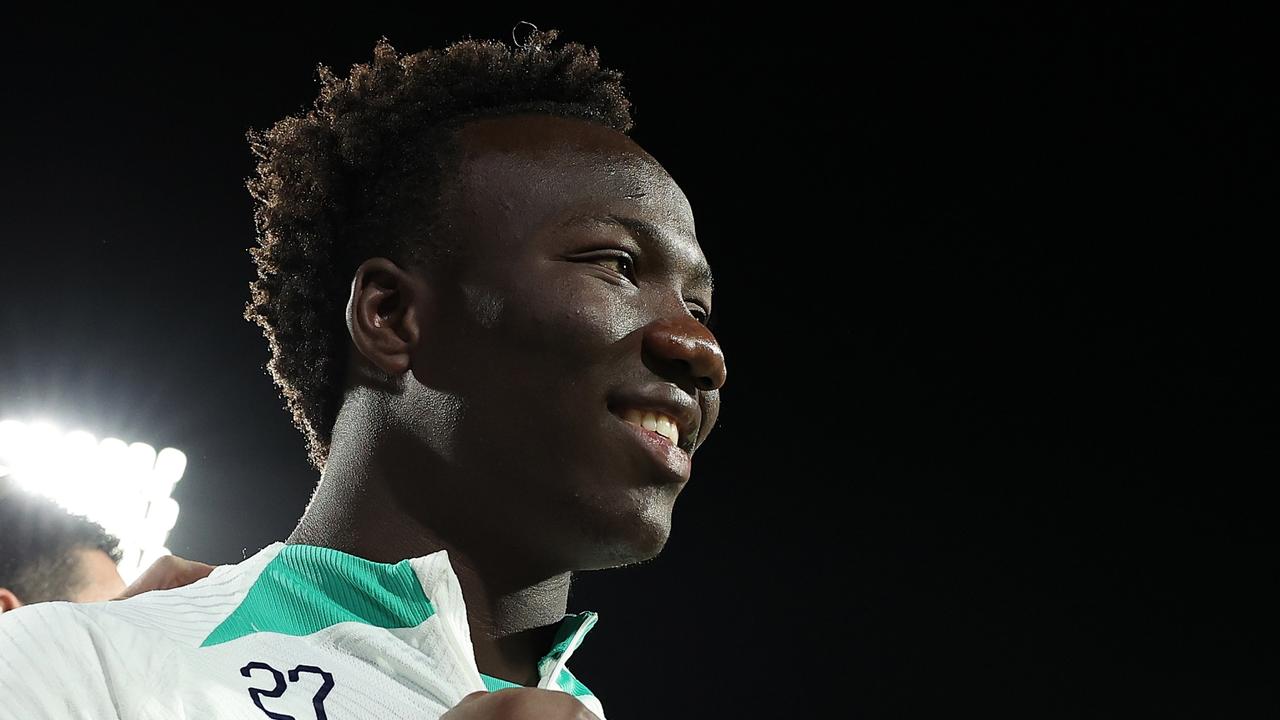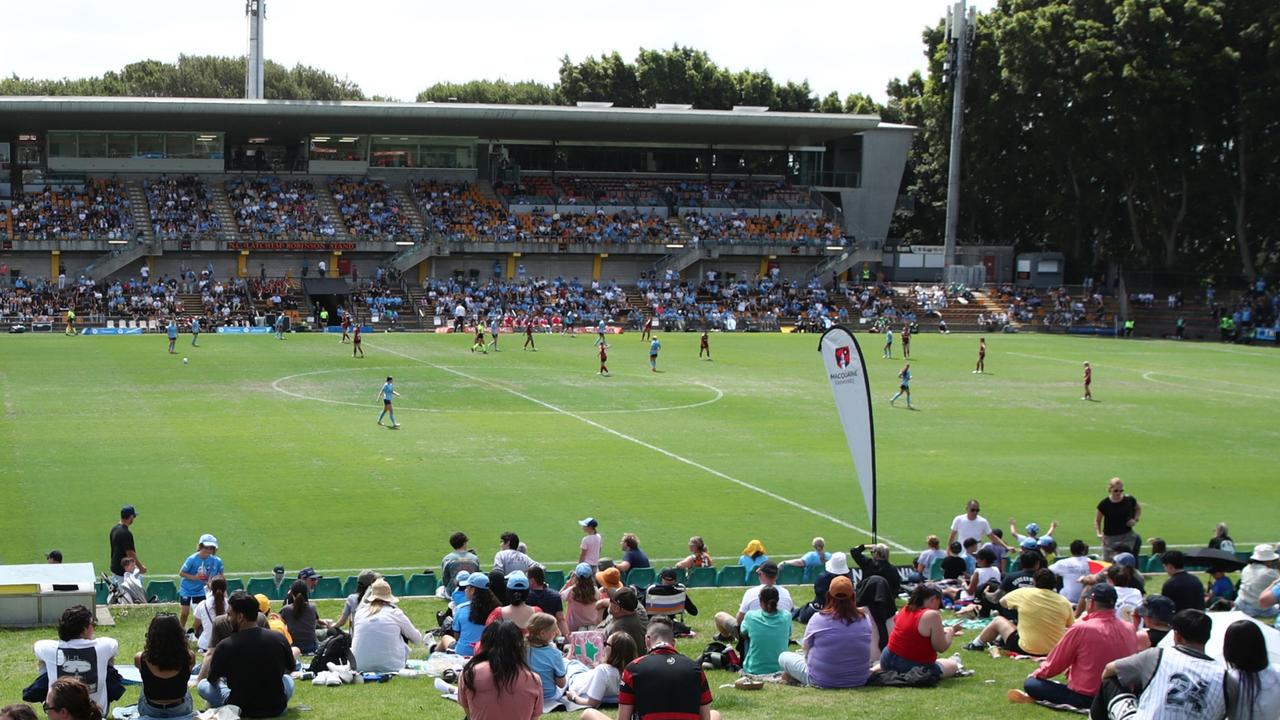Why the Macarthur A-League betting scandal could be the tip of the iceberg
The recent A-League betting scandal has highlighted the unhealthy relationship between sport and betting, ERIN SMITH talks to an expert about the damage that can be done at lower levels of sport.

A-League
Don't miss out on the headlines from A-League. Followed categories will be added to My News.
There is an unhealthy relationship between sport and betting and with the number of markets growing to include second and third tier competitions a leading expert in sport law says it only increases the chances of more match fixing scandals.
The Australian Professional League, Football Australia and club Macarthur Bulls are desperately working to deal with the fall out of the biggest betting scandal to hit the A-Leagues since its inception.
Three Macarthur Bulls players; Ulesis Davila, Clayton Lewis and Kearyn Baccus, were on Friday charged with engaging in conduct that corrupts a betting outcome of an event.
NSW Police allege a person they dubbed the “controller” had organised the three players to pick up yellow cards at certain times during four matches this season – with the players successful twice.
Betting and sport go hand-in-hand in Australia – with betting companies often sponsoring major sporting codes.
But it isn’t just limited to the elite competitions.
Just this weekend people can place a bet on more than 50 football matches on global betting platform Bet365 – including the A-League’s semi-finals and NPL competitions in all states.

The NPL competition, while a men’s and women’s league, features youth teams from A-League’s clubs with players as young as 16.
It is not just limited to football, there were markets for second tier basketball, rugby union and the VFL all on offer this weekend -via various bookmakers.
One site, which Australian users were not able to place bets via, even went as far as to liken the NPL Victoria competition to the English Premier League.
NSW Police allege a person they dubbed the “controller” had organised the three players to pick up yellow cards at certain times during four matches this season – with the players successful twice.
APL Independent Chair, Stephen Conroy said the allegations were “serious and highly concerning”.
“The integrity of our sport is something that has to be protected without compromise,” Conroy said,
“There are important and significant measures in place given the global nature of both our game and the gambling industry – and this work won’t stop to protect the integrity of this league.
“We continue to work closely with Football Australia and all relevant agencies on this investigation and will make further commennt in time.”
Melbourne University Professor of Law Jack Anderson is an expert in sport law – just last month he presented at the FIFA conference regarding match fixing in football.
Anderson said it wasn’t a new concept and said there had been similar instances of players deliberately getting yellow cards to alter betting outcomes in England.
“Australia has a very healthy, economically, betting culture with plenty of opportunities to bet on various aspects of a sports event,” Anderson said.

“The more games are streamed or televised the more gambling markets occur and the greater vulnerability.”
Anderson said what was interesting about this alleged betting scandal was the betting allegedly took place in South America.
“That gives you the global reach of it, we have to be aware of the global reach of gambling and gambling markets,” he said.
Anderson said there had been several cases around the world similar to that allegedly taking place in the A-Leagues but was different was the police involvement.
“So far from what we can see is the police in New South Wales are using the deterrent effect of what they’re doing because the overall threat to football by this type of activity is significant,” Anderson said.
“If you don’t believe what you see on the football pitch, in terms of yellow cards, in terms of results, then the value of the sport, the integrity of the sport is completely lost.
“Sport is one of the few areas of entertainment that is unscripted so if we discover that it’s predetermined for betting purposes then it loses all value.”

While Anderson can’t speak to the specifics of the case he said it was unusual for athletes to be given lengthy sentences for these types of crimes.
“There is a recognition that these types of cases are taken more for their deterrence value, we have seen in the past in other jurisdictions people get jail time, it is possible but it doesn’t tend to happen,” Anderson said.
Instead players are generally punished by their sporting body with fines or bans. Football Australia has already imposed a no fault interim suspension notice to all three footballers alleged to be involved.
Anderson said Australia was a leader when it came to sports integrity.
“Our police have specialised knowledge, we have specialised laws and Australian sporting bodies are leaders in the integrity space, but as you can see no country is immune from it,” he said.
Anderson said it was hard to separate sport and gambling.

FOCUS ON THE PLAYERS
Sporting bodies, such as Football Australia, take a percentage from betting agencies profits or depending on the deal can take a cut from every bet placed.
Anderson said it was important for governing bodies to take a step down and focus on their athletes.
He said this alleged incident highlighted how widespread the problem is.
“From what we know it is some sort of crime syndicate in one of the players’ home countries and it was done at their behest,” Anderson said.
“We’ve no evidence that they threatened the player, no evidence of anything like that but in other countries we have evidence that players are vulnerable to these types of approaches and have been coerced into doing things that they shouldn’t do.
“It’s important, and all sport bodies do this, they profile their players for players who have certain addictions or other vulnerabilities.
“Sometimes it’s young players who can be influenced by people, sometimes it’s older players coming to the end of their career who feel that they haven’t retained as much money as they should have or sometimes and the research really shows it is players who are poorly paid, a correlation between them and being approached for match fixing purposes.”
Anderson said he felt there was still more to be revealed about this alleged incident.
“These three players might only be the tip of the iceberg,” Anderson said.
“There may be a whole criminal network behind this, we don’t know.”
More Coverage
Originally published as Why the Macarthur A-League betting scandal could be the tip of the iceberg





